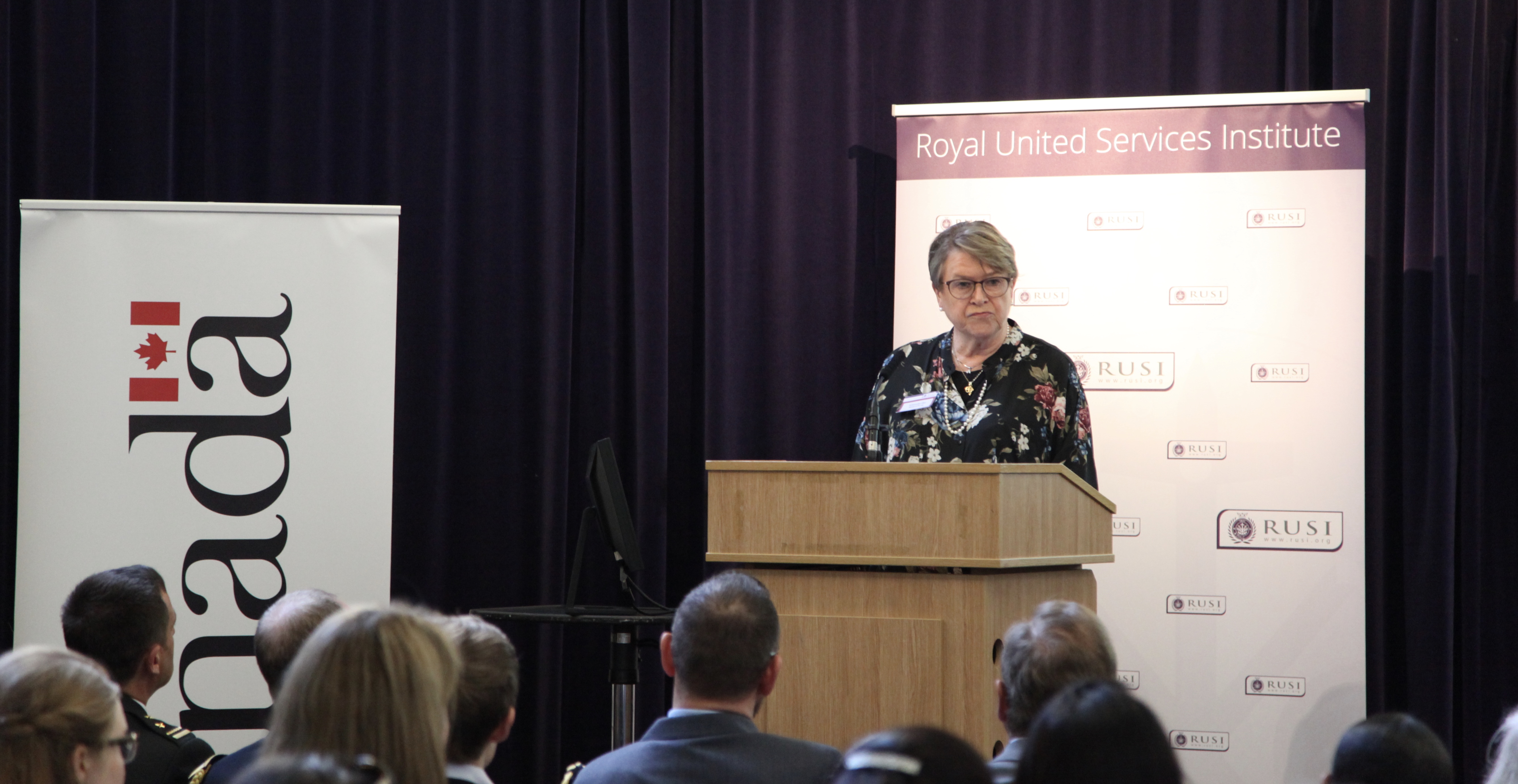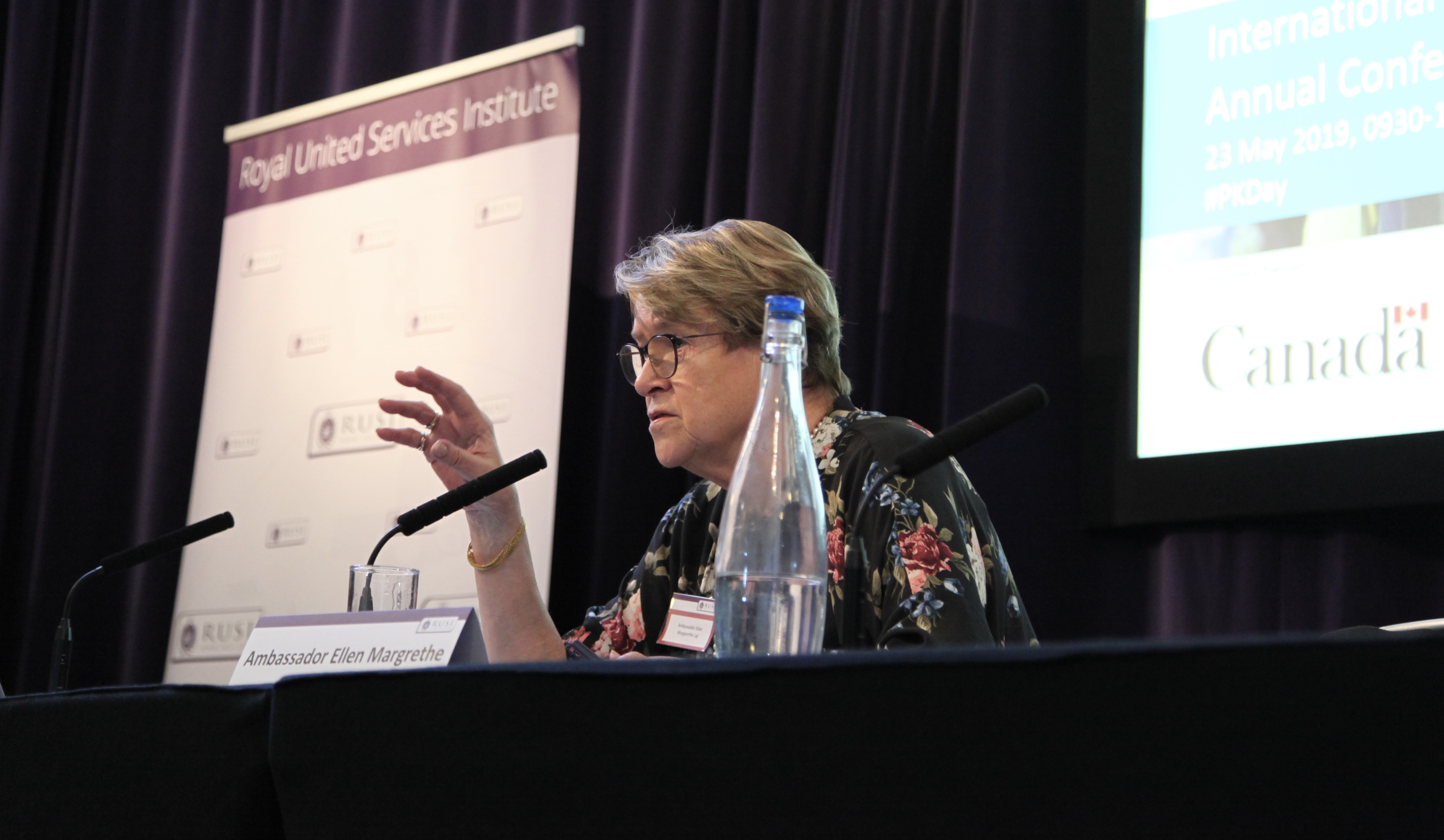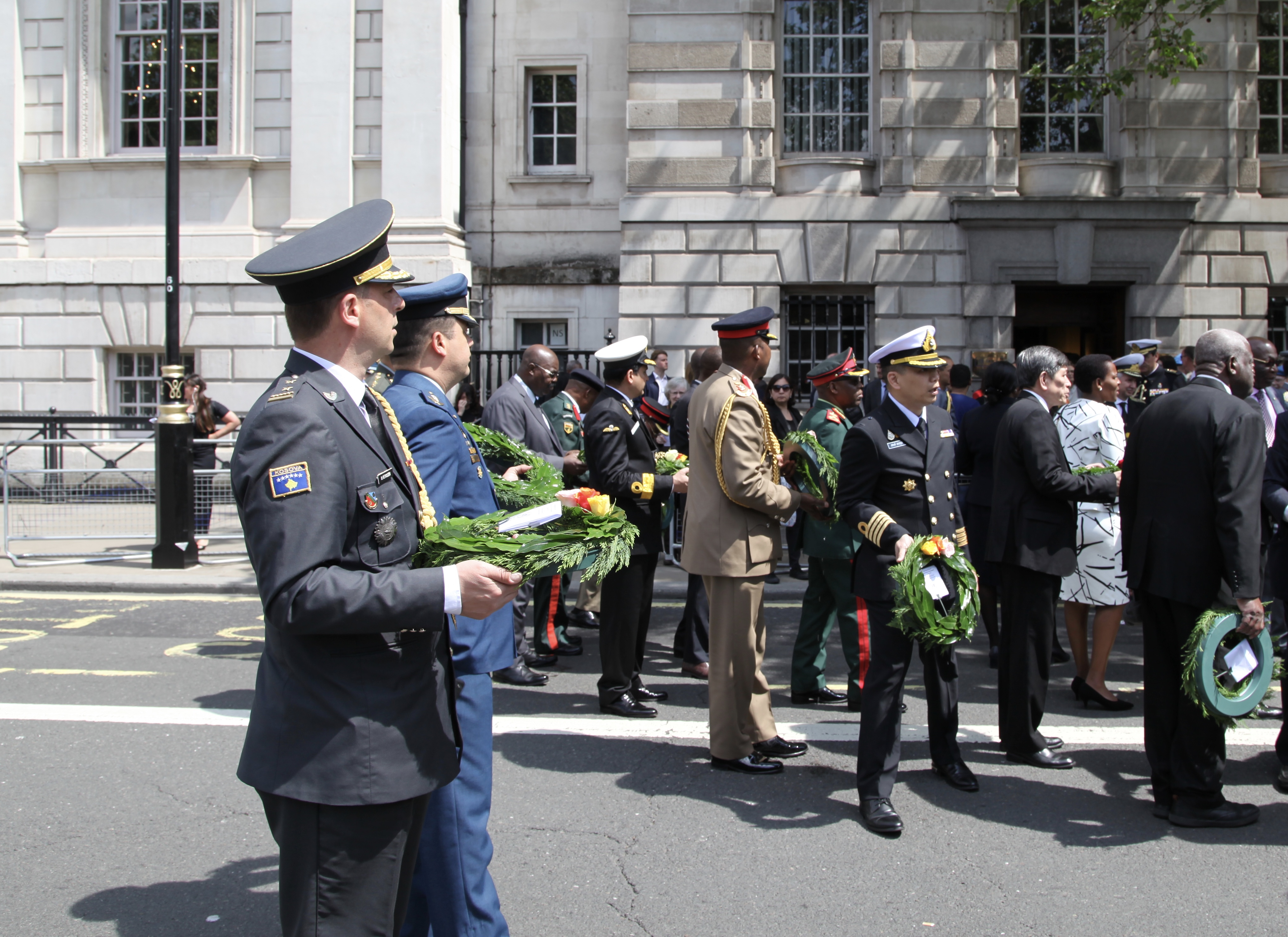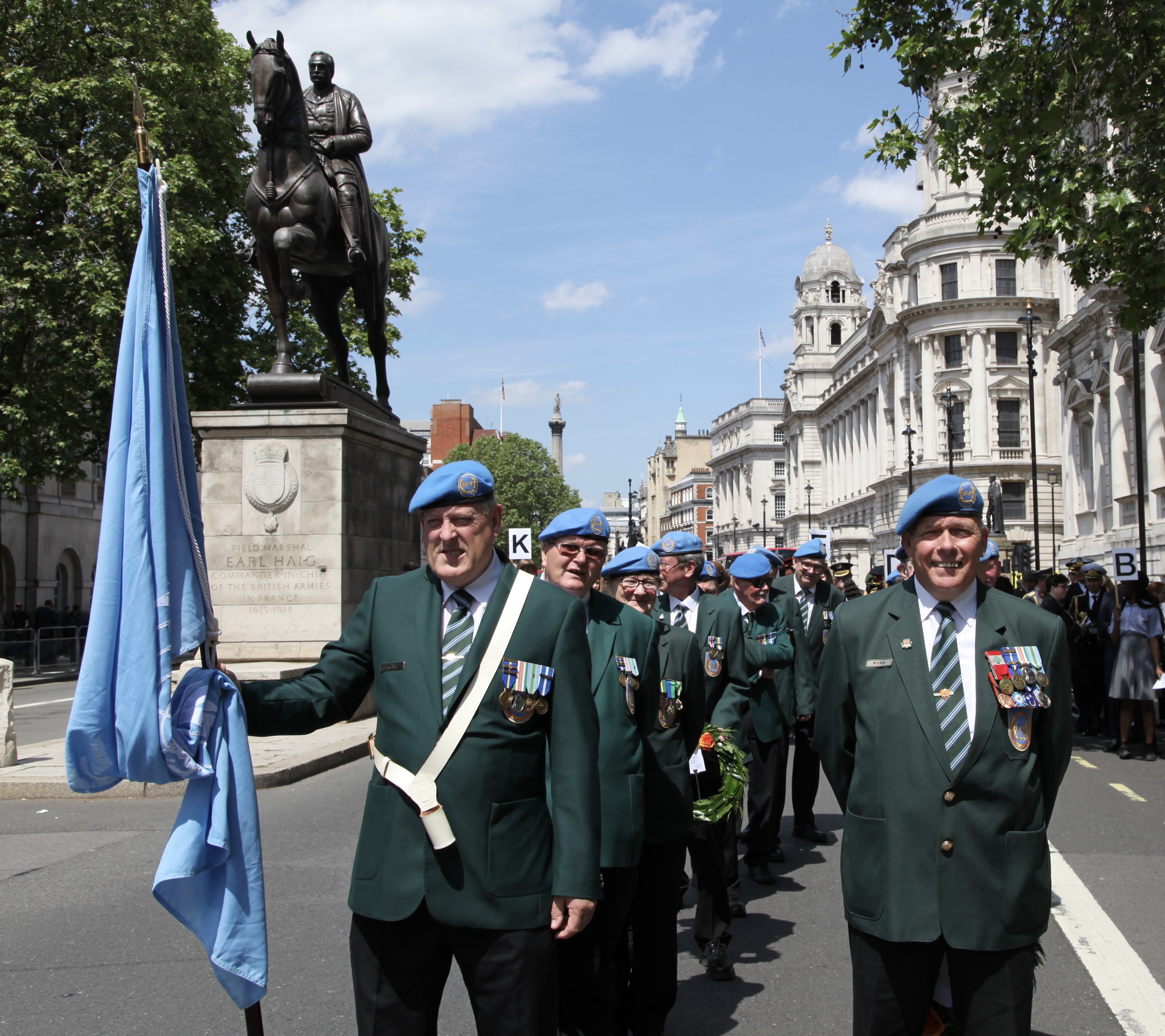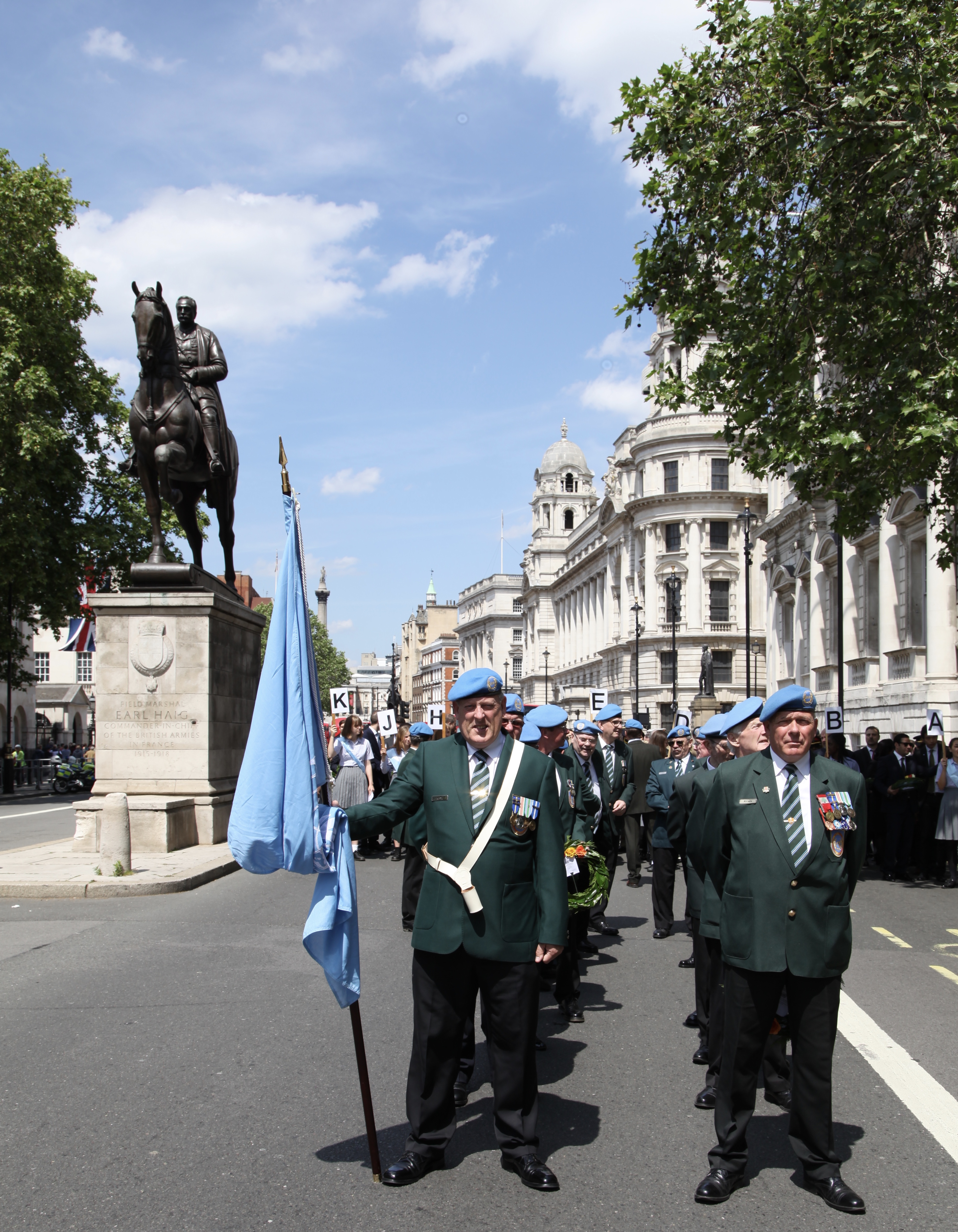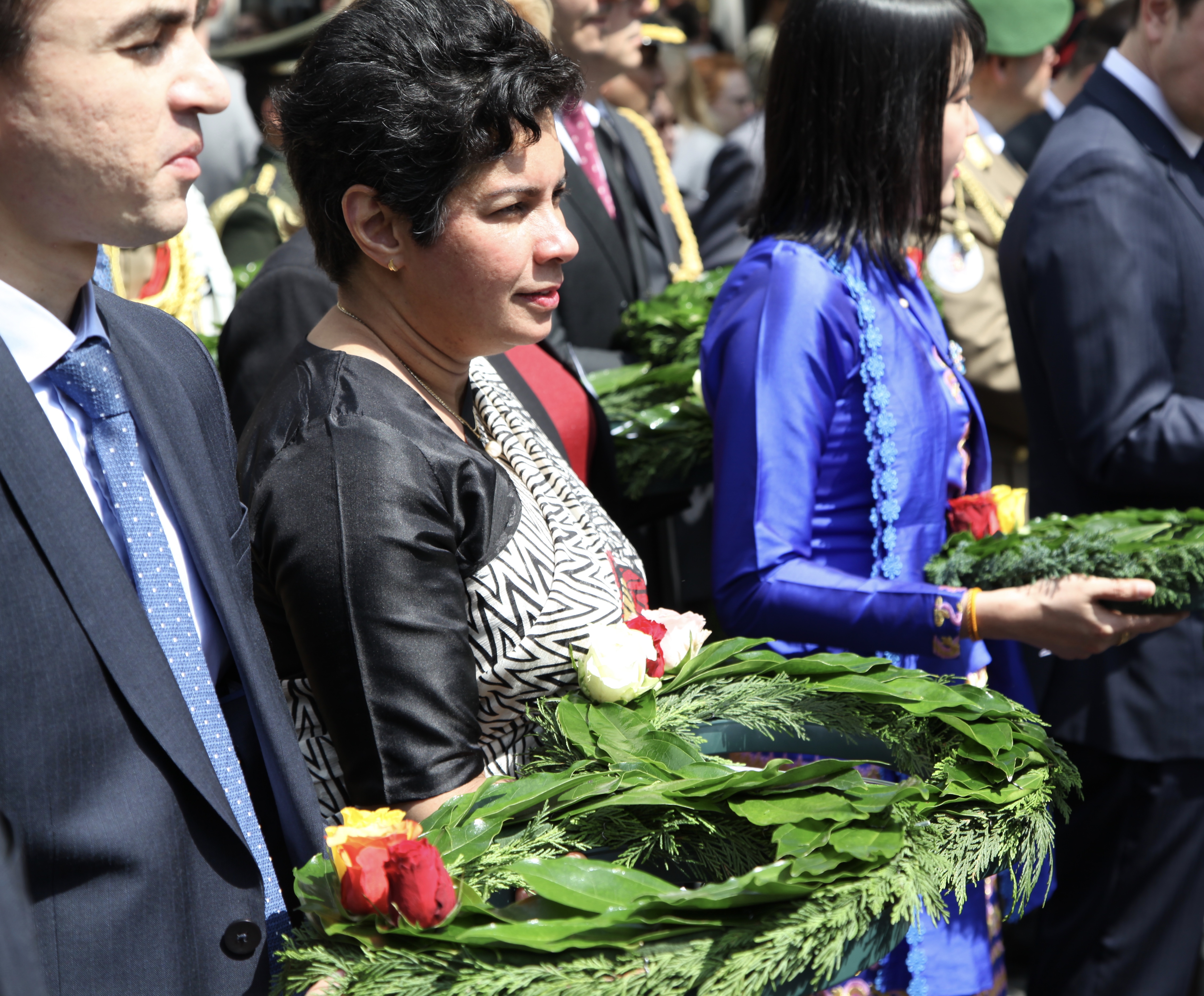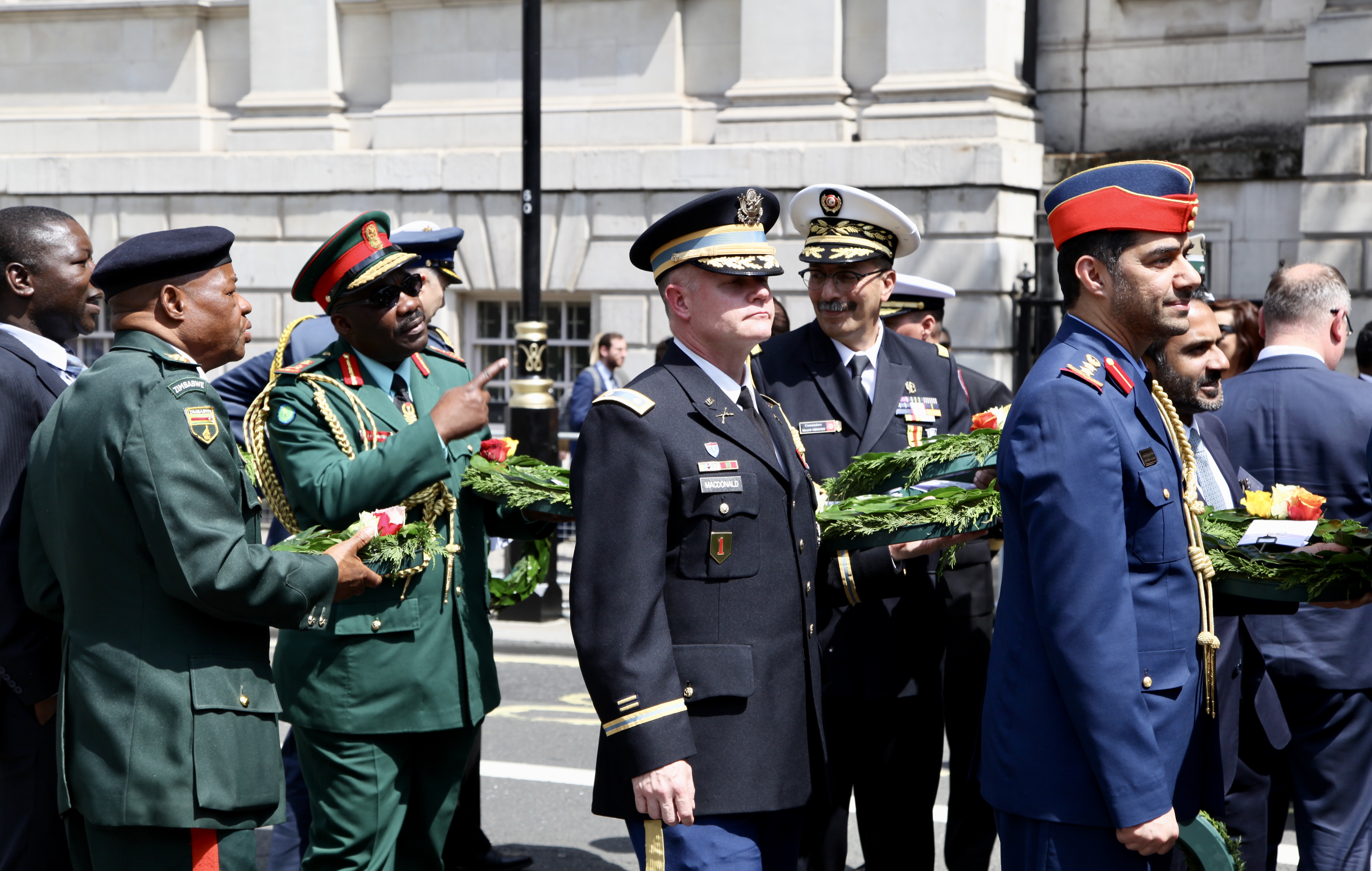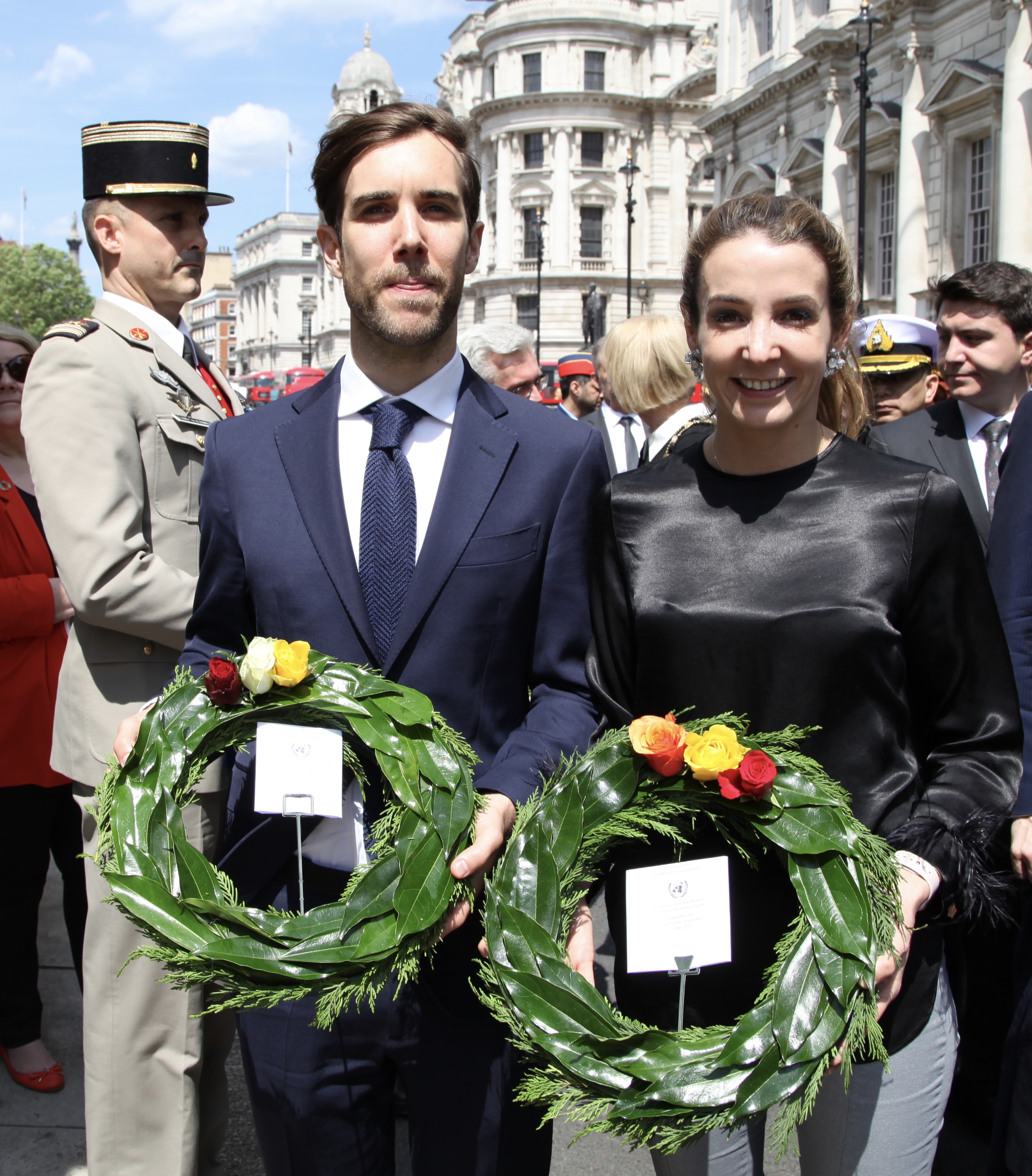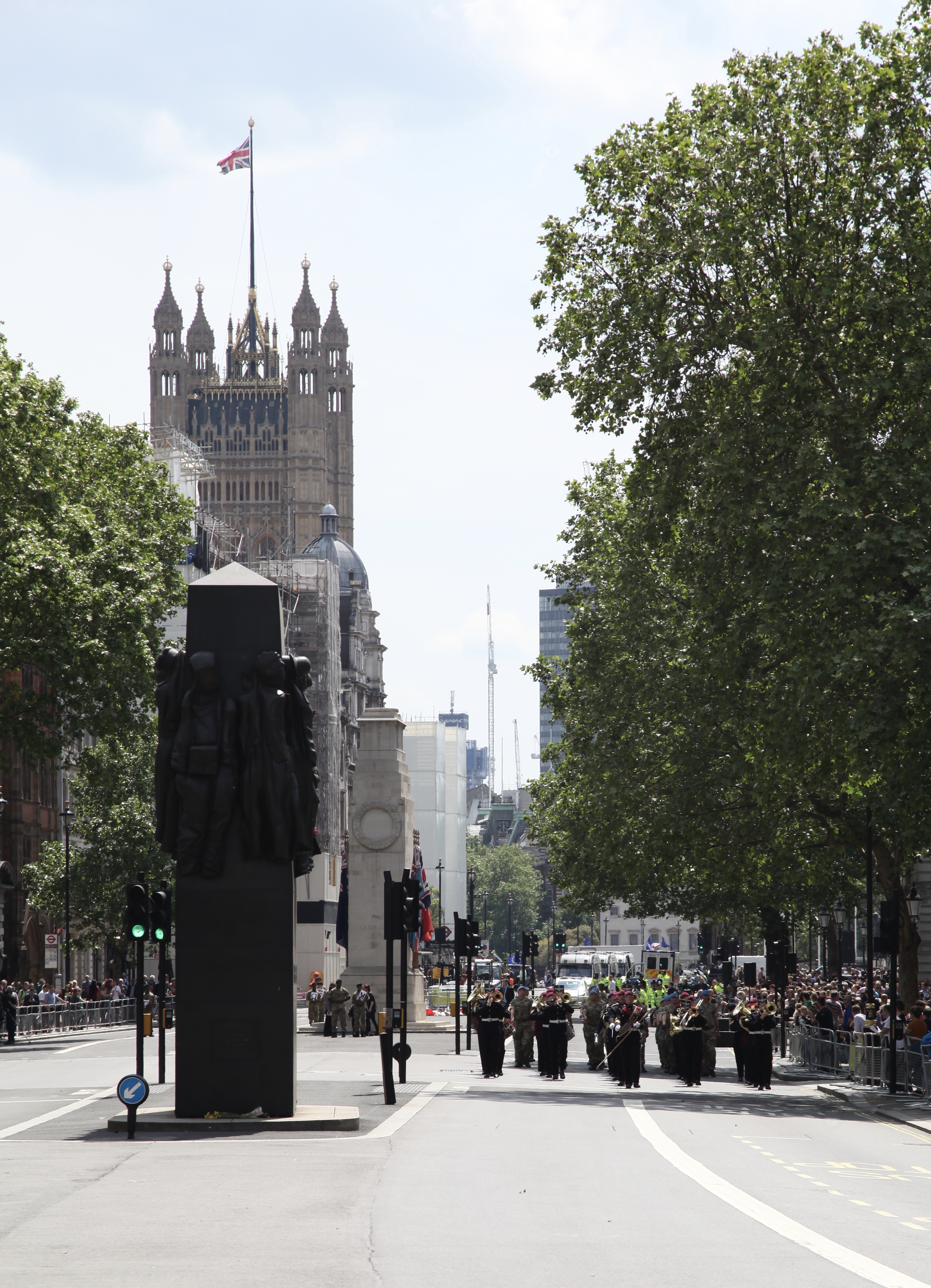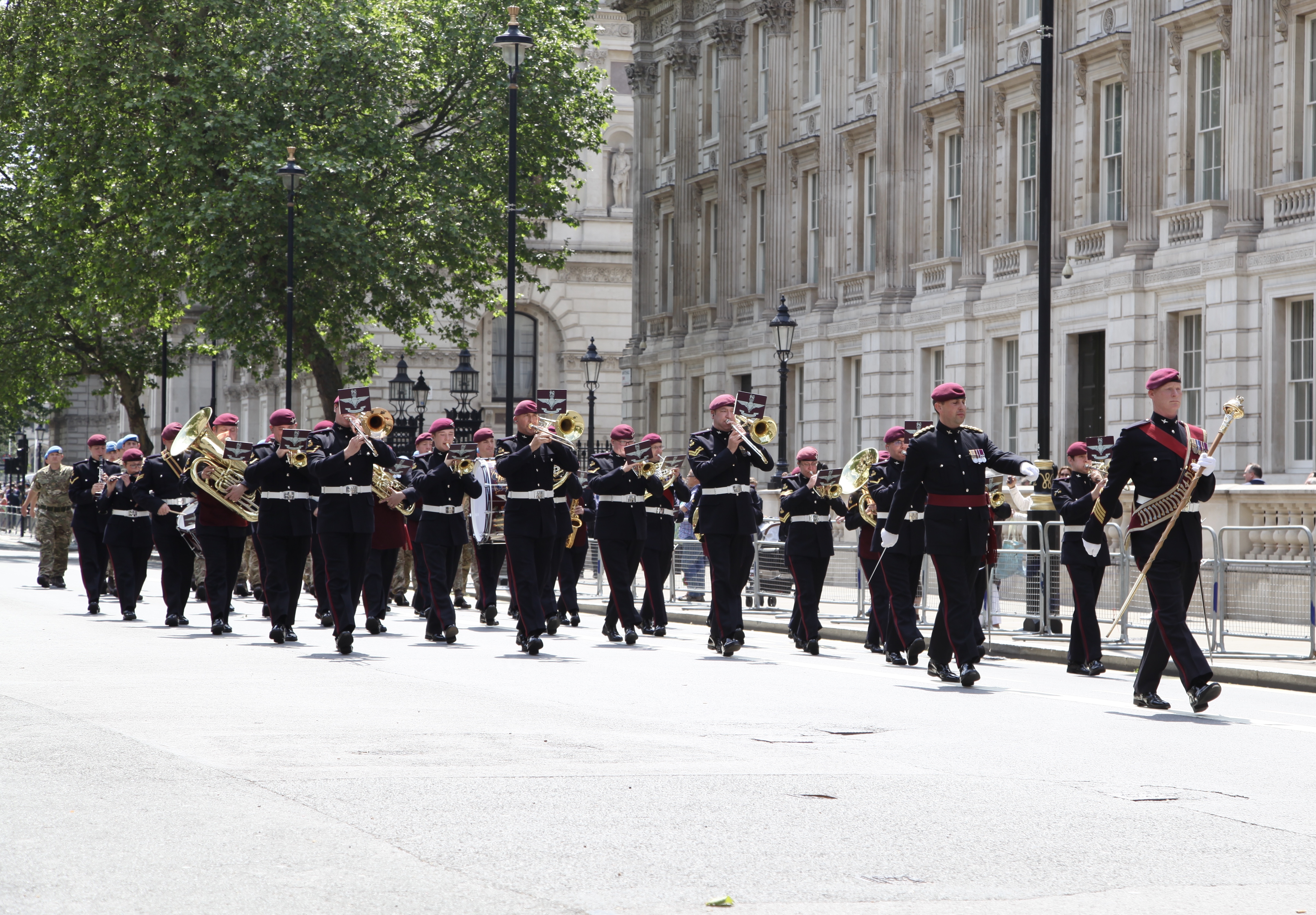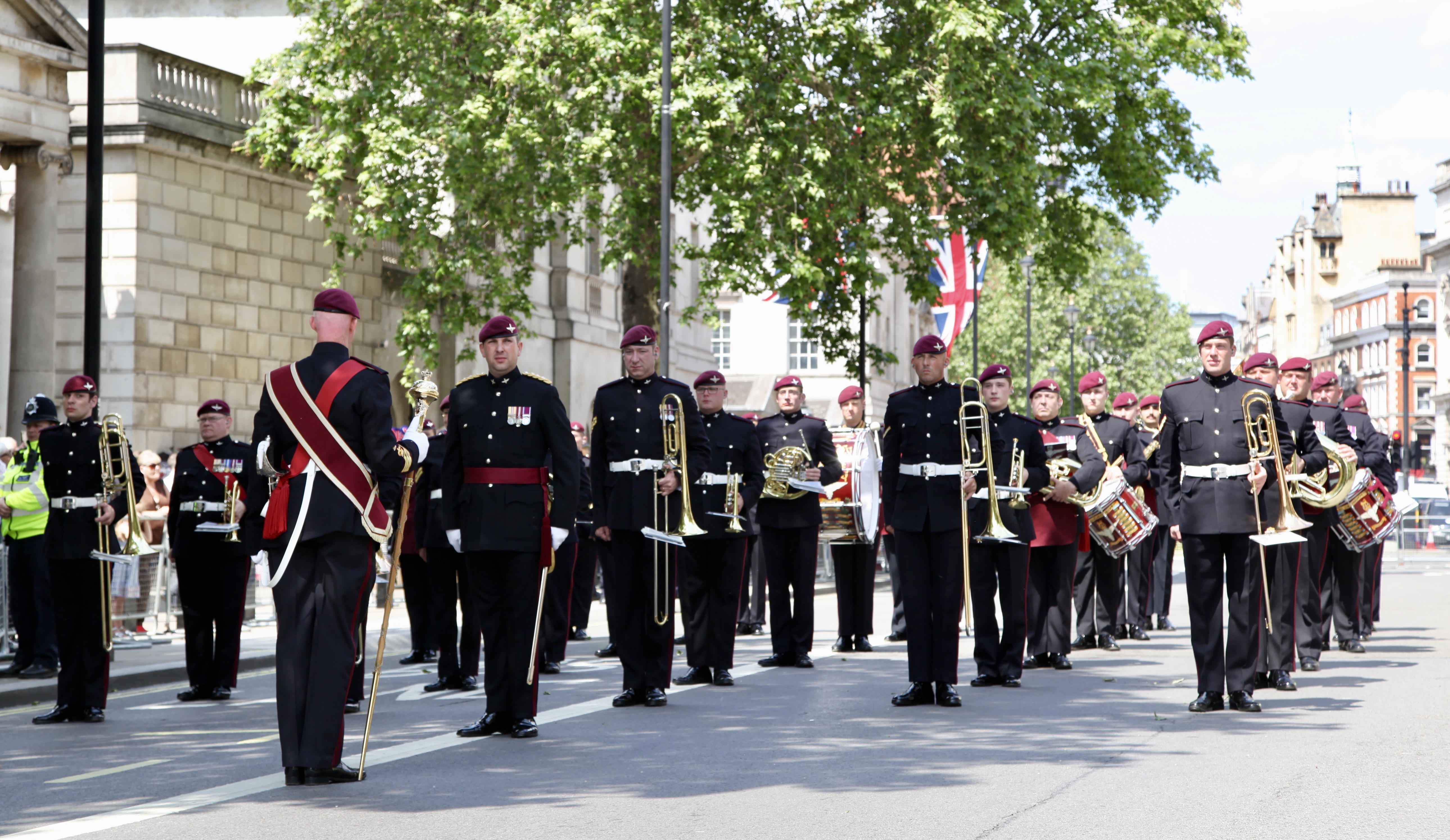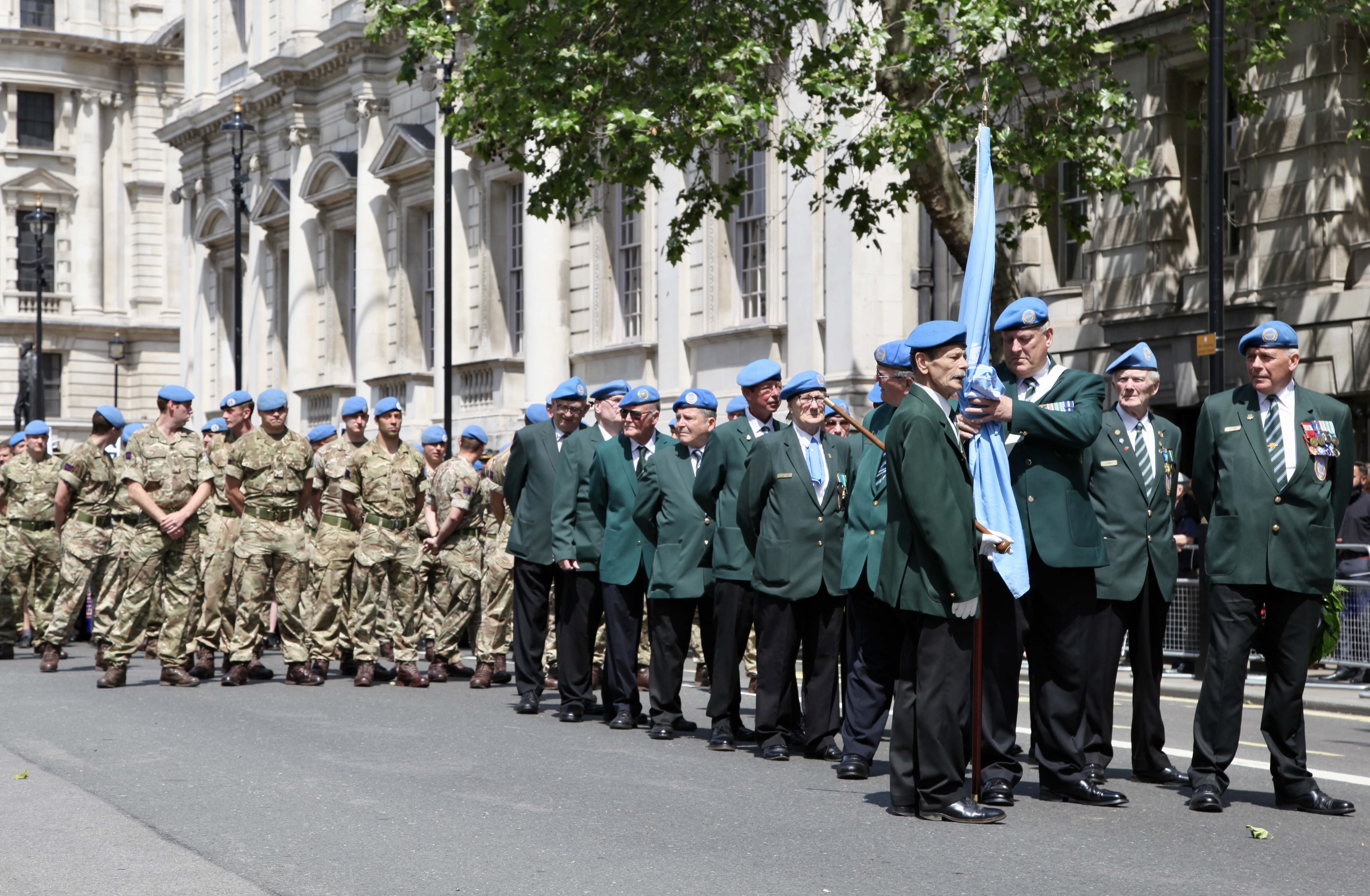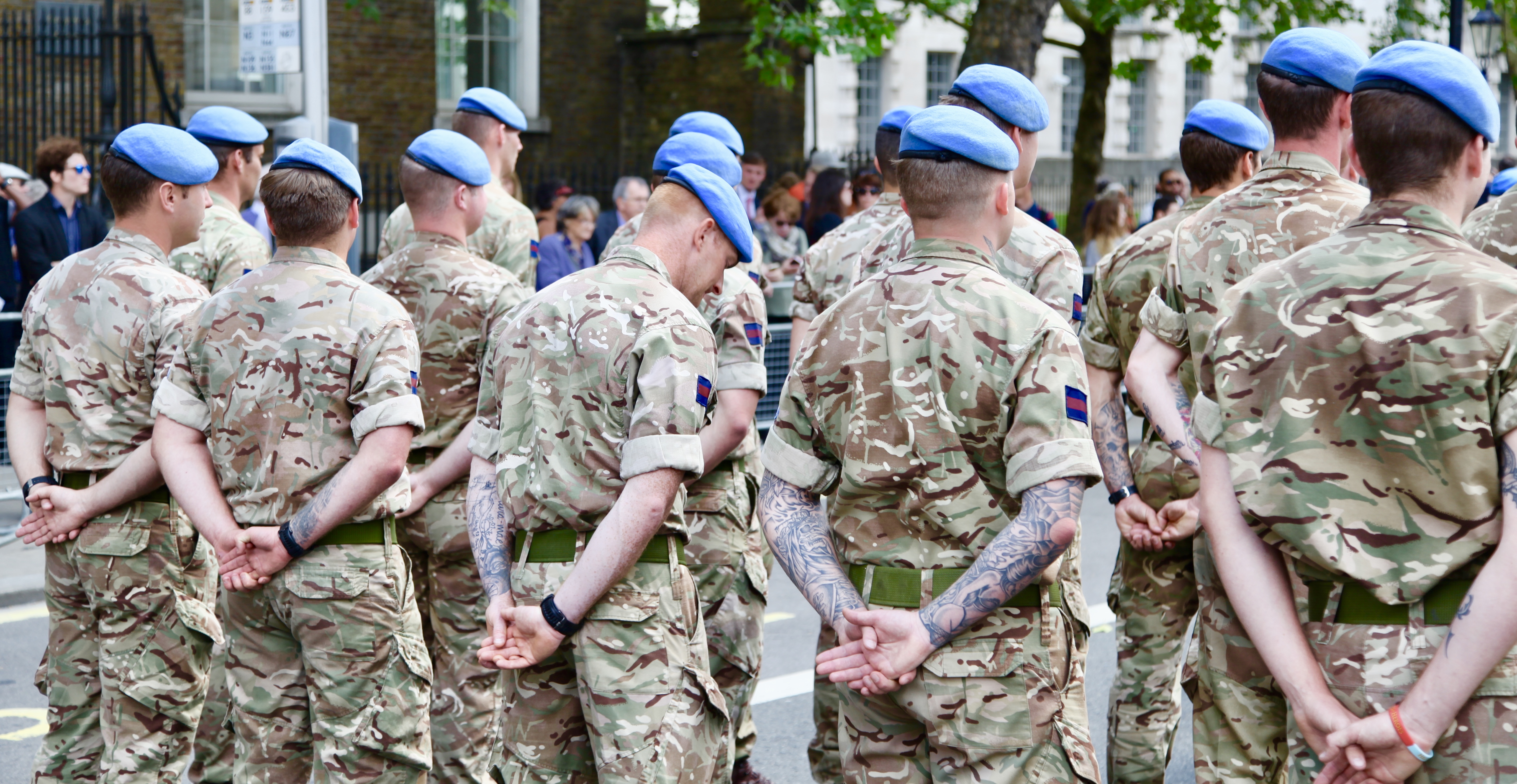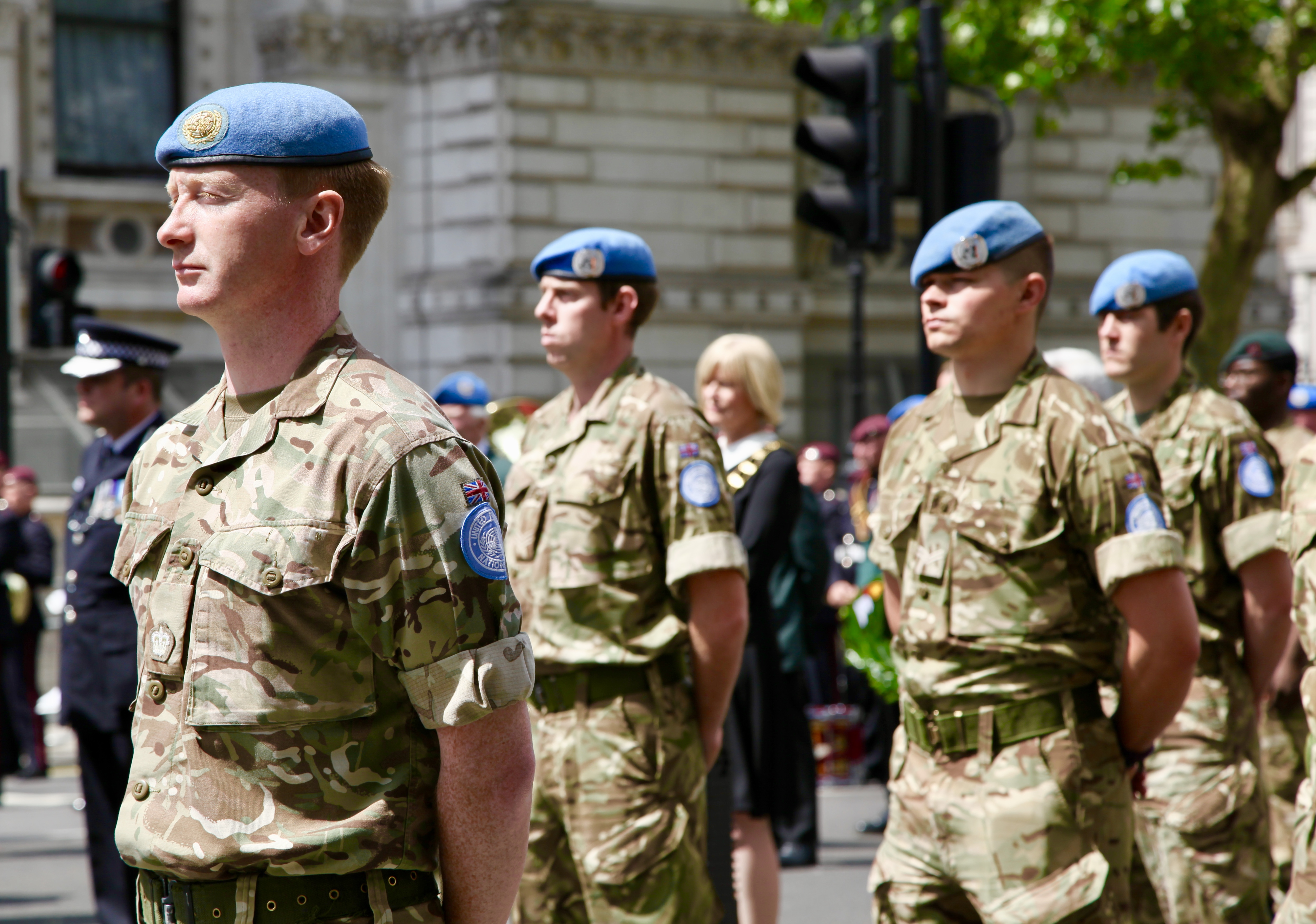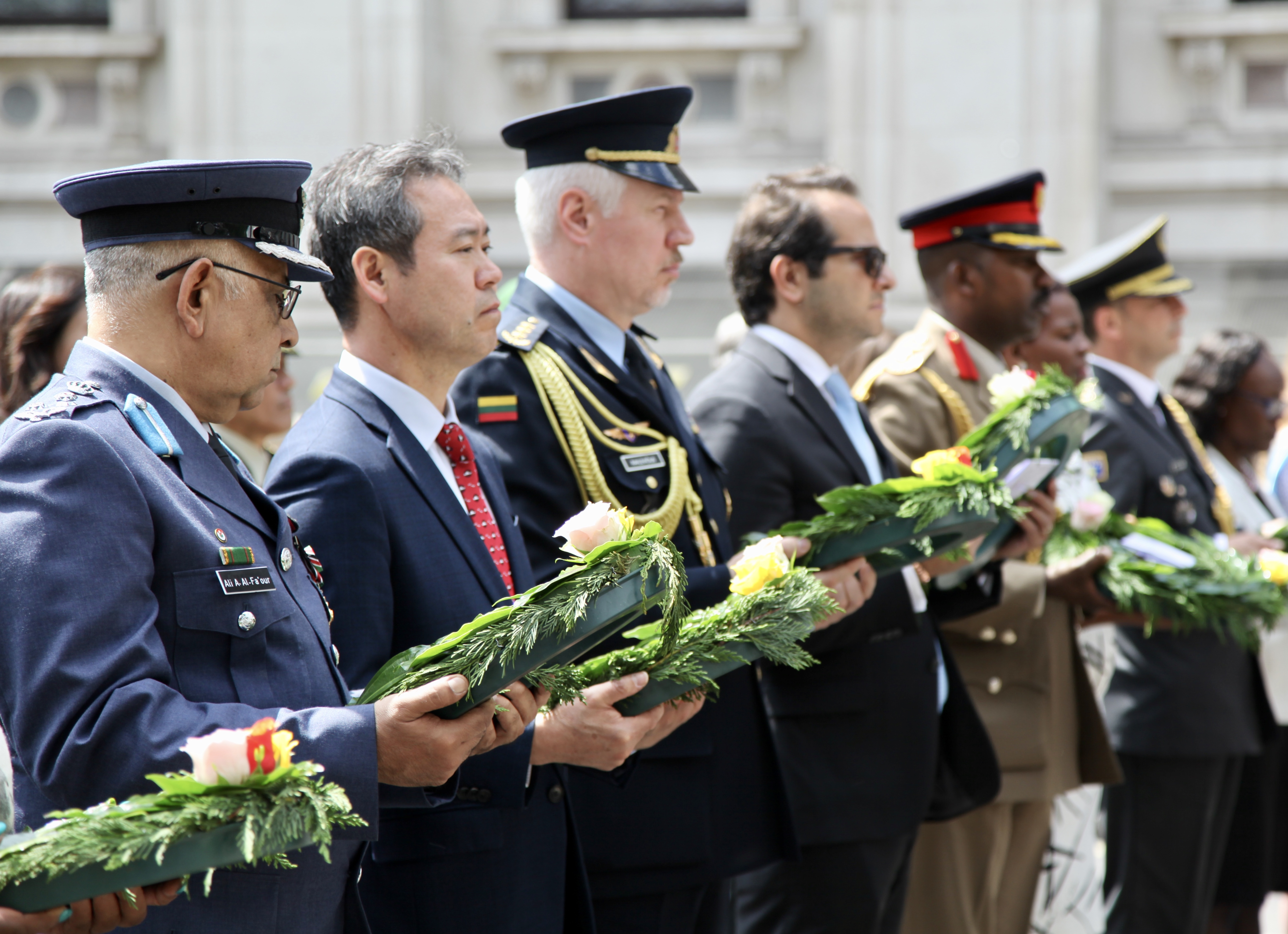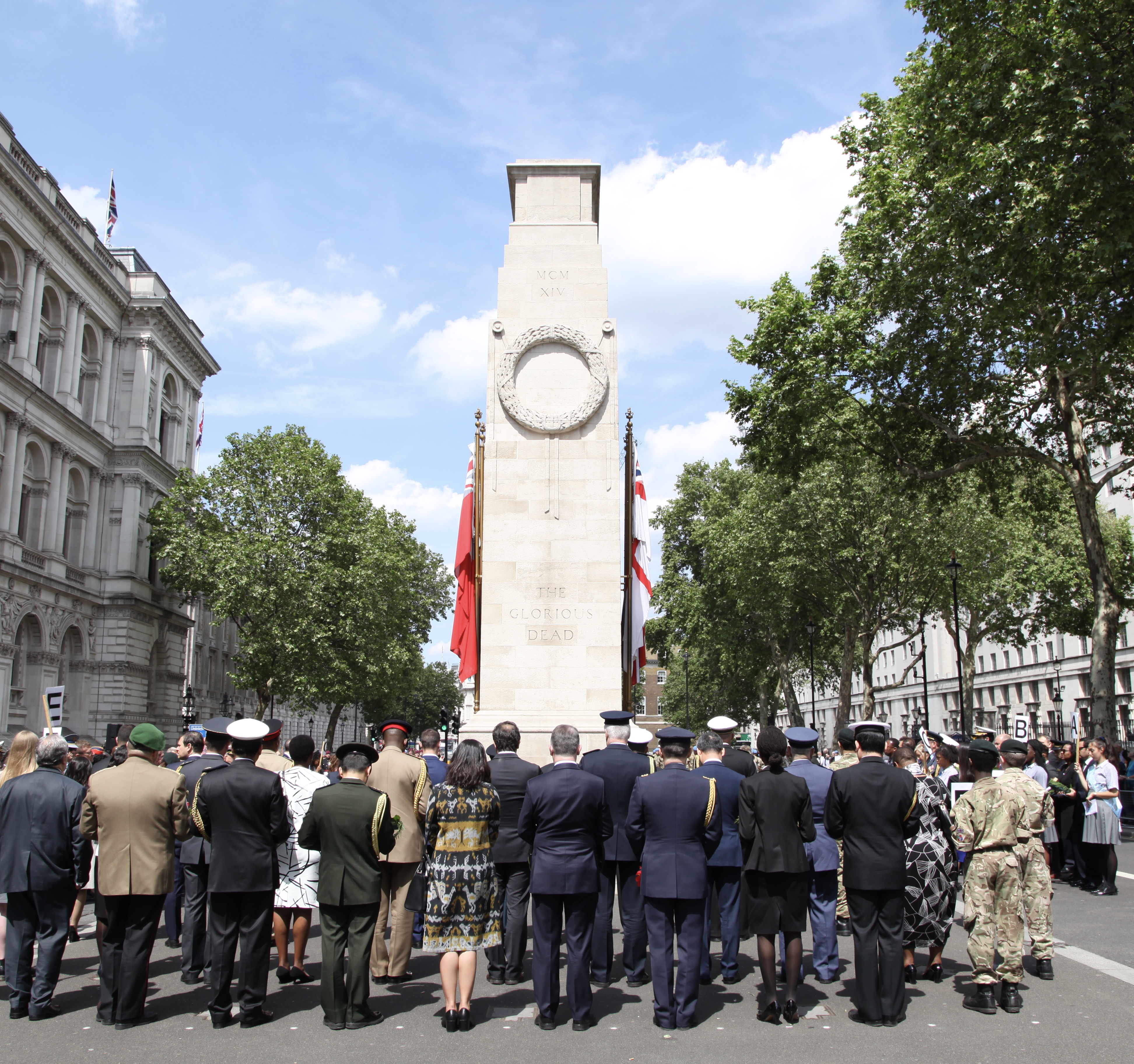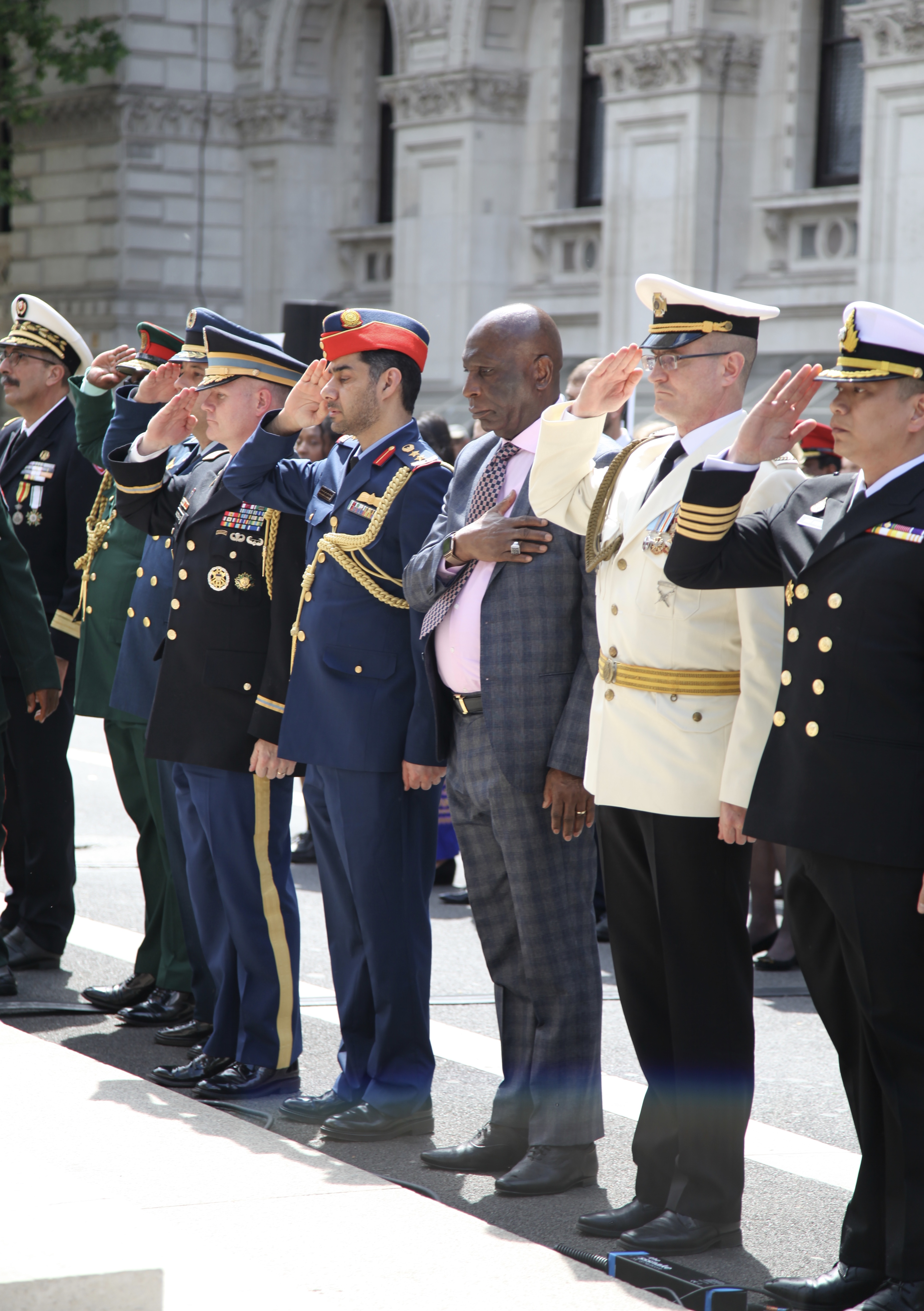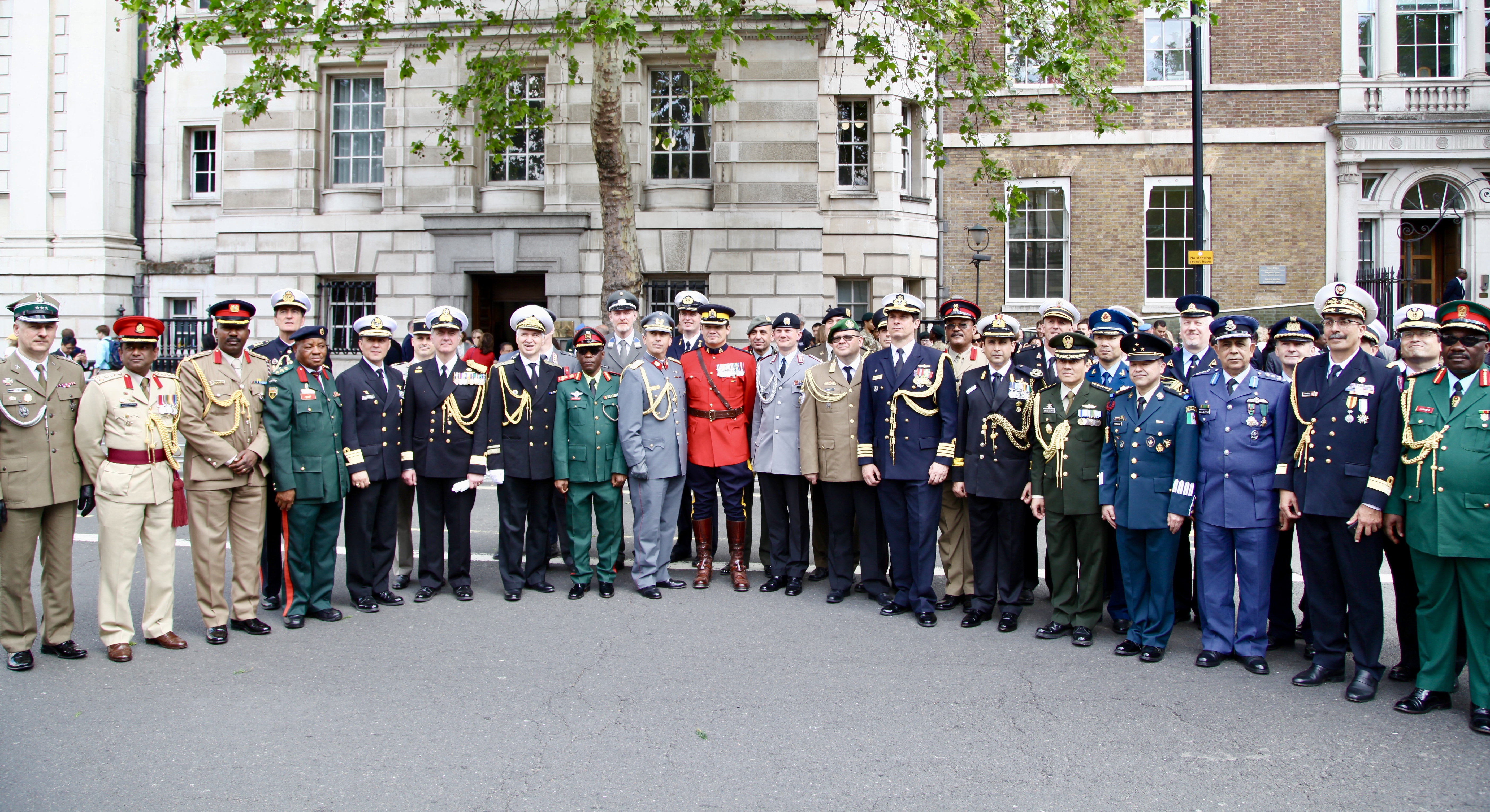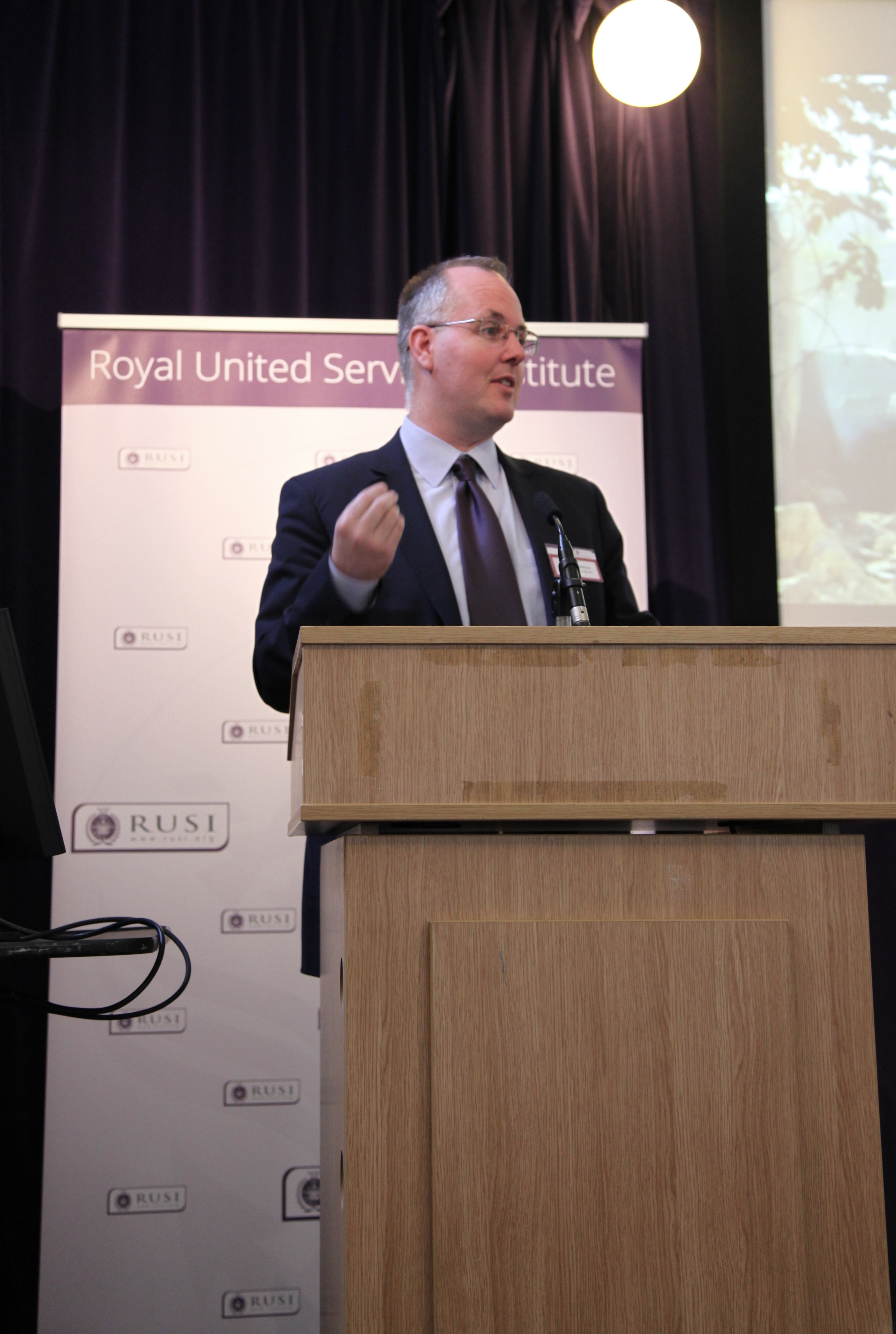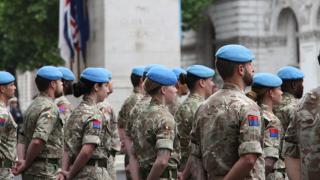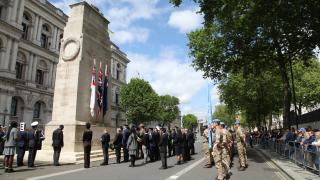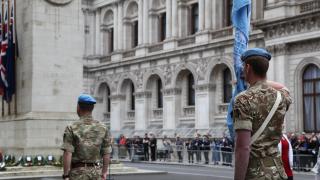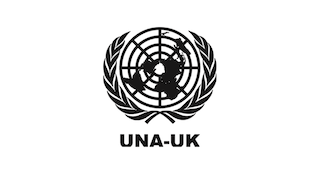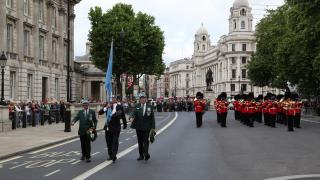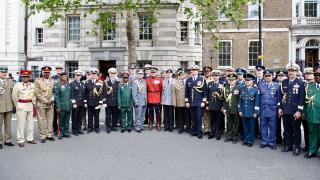
On 23 May UNA-UK and partners the Royal United Services Institute (RUSI) and UNA-Westminster hosted a conference and memorial service to mark the International Day of UN Peacekeeping.
The moving ceremony took place at the Cenotaph on Whitehall, and for the first time was attended by a contingent of British Peacekeepers recently returned from tours in Cyprus (the 1st Battalion of the Scots Guards) and South Sudan (Defence Medical Services). Representatives from 108 embassies, primarily Ambassadors and Military Attachés, laid wreaths at the cenotaph to remember the 3,842 UN peacekeepers who have lost their lives in the service of peace since 1948.
The ceremony marked the mid-point of the day-long conference on UN Peacekeeping being held at RUSI. One of the world’s largest conferences dedicated to peacekeeping brought together experts and practitioners for a day of discussion on recent developments in peacekeeping.
Entitled “The Thin Blue Line” this year’s special focus was placed on the less military aspects of peacekeeping with panels on UN Policing, on the politics of peacekeeping and whether the UN should “take sides,” and two insightful lectures from Ambassador Ellen Loej (a former UN Security Council ambassador and twice Special Representative of the Secretary General and head of a UN peacekeeping mission) and Professor Paul D Williams (an academic expert introducing his book on the African Union peacekeeping mission to Somalia).
Lord Tariq Ahmad of Wimbledon, Minister of State for the United Nations, opened proceedings alongside Sarah Fountain Smith, Deputy High Commissioner for Canada to the UK. Lord Ahmad reaffirmed the “UK stays absolutely committed to the UN peacekeeping agenda.”
Ms Smith highlighted Canada’s role in establishing smart pledges such as the Vancouver Principles which will better prepare personnel to respond when parties in conflict may be using child soldiers.
Both raised the importance of women’s participation in peacekeeping, emphasising that their involvement leads to longer lasting peace. They pledged support for Canada’s ‘Elsie initiative’ which rewards Troop Contributing Countries for deploying female peacekeepers.
The first panel session of the day – chaired by Dr Karin von Hippel – ‘Should the UN Take Sides’ raised the question of whether the UN should be a party to the conflict in the country in which it attempts to keep the peace and whether it should engage in counterterrorism work and proactively use force.
Matt Preston of the Multilateral Research Group, Foreign and Commonwealth Office, argued that fundamentally the UN should not take sides. However, he acknowledged the question is not black and white as realities on the ground can be complex.
Lenneke Sprik of the University of Groningen outlined the consequences a decision to use force more readily would have for the legal position of UN peacekeepers as a party to a conflict, and the effects this would have on Troop Contributing Countries readiness to participate.
While highlighting that that there are no easy solutions to the complexities of peacekeeping operations, Fred Carver, Head of Policy at UNA-UK, made the case that the UN should avoid HQ level strategic decisions to use force more assertively, but should give field commanders more flexibility in how they act.
Mr Carver also urged the UK to increase its influence by extending its participation in peacekeeping:
“If the UK wishes to exert influence in UN peacekeeping, it needs to have ‘skin in the game’… we hope that our new Secretary of State for Defence will have positive news for us as the UK sets out its contributions to UN peacekeeping post 2020.”
This year’s Folke Bernadotte Memorial Lecture was delivered by Ambassador Ellen Margrethe Loej – former Special Representative of the Secretary- General for UNMIL (Liberia) and UNMISS (South Sudan).
Ambassador Loej gave the audience an account of her time at the UN Security Council and leading UN missions.
“The mission in South Sudan is still, like the missions in countries like Mali, Central African Republic and the Democratic Republic of Congo, facing serious challenges due to the lack of – or at least the implementation of – a political solution.”
She acknowledged that while there are historical failures of UN peacekeeping, multiple improvements have been made but warned “there is no recipe that can be applied across the board.”
“It should not be forgotten that many changes have been made in improving the functioning of UN peacekeeping over the years. Let me just mention the Brahimi report, the HIPPO report and the Secretary General’s ‘Action for Peacekeeping’. However, many of these changes or proposals require the support of Member States to be implemented – and that support is not always forthcoming.”
To close, she reminded sceptics that the cost of peacekeeping is far cheaper than the cost of war, issuing a call to international co-operation.
“A United Nations peacekeeping operation is not only multinational and multicultural -it is also multidimensional and civilian lead. That diversity should be utilized to better implement the mission mandate – instead of pointing fingers at one another.”
You can watch the complete lecture here.
After lunch, and the memorial ceremony, the Dame Margaret Anstee Seminar turned its attention to UN policing, a vital and often overlooked element of UN peacekeeping operations.
Discussants were Andrea Meyer, Deputy Director, Peace Operations, Stabilisation and Conflict Policy, Global Affairs Canada, Inspector Cris Gastaldo, Regional Manager Liaison Officer, Royal Canadian Mounted Police and Colonel Nicola Mangialavori, Italian Carabinieri.
Both Ms Meyer and her colleague Insepector Gastaldo highlighted Canada’s feminist foreign policy and emphasised the centrality of the women, peace and security agenda to Canadian peacekeeping.
Insp. Gastaldo went on to address more generally Canada’s non-militarised approach that sees peacekeepers only being armed if deemed necessary, and the difficulty in keeping a balance between committing more troops and ensuring their quality.
On reflection of his own experiences, with particular focus on Iraq, Colonel Mangialavori explained how UN common training programmes for policing had been created in response to the challenges of working with different participatory countries. He also noted Italian efforts to increase women’s participation in peacekeeping and policing.
The conference was brought to a close by Professor Paul D. Williams who gave a comprehensive overview of the UN Mission in Somalia, which was outlined in the following 10 points.
- Partnership is the new normal in African peacekeeping
- Success requires unified and sustained political support
- Without unified command and control the mission will always be less than the sum of its national parts
- Beware optimistic planning assumptions
- Don't fight a war using logistics designed for peacekeeping and not under the commander's control
- Security sector reform relies on politics. You can't build a national army if you don't have a nation
- Not having a protection of civilians’ mandate doesn't mean civilians won't expect to be protected
- Missions need to invest in strategic communications
- Stabilization means having effective local partners. Without them you can clear but with no peace dividend you cannot hold
- Peacekeepers are not in control of their own exit. Politics determines when you can leave
Speeches and presentations:
Wreath Laying ceremony
The following people laid wreaths to commemorate peacekeepers who had died in the service of the United Nations.
In memory of Count Folke Bernadotte - Count Edward Bernadotte (grandson)
On behalf of UN servicemen and women - Kieran Ryan, Chair, UN Veterans Association
In Memory of Commandant René de Labarrière - Lieutenant Colonel Grégoire de la Bernardie, Defence Attaché to the French Embassy
On behalf of Her Majesty’s Government - The Rt Hon Mark Lancaster TD MP, Minister of State for the Armed Forces
On behalf of Her Majesty’s Armed Forces – A recently returned british soldier
On behalf of Her Majesty’s Police Forces - Assistant Commissioner Martin Hewitt QPM, Chair of the National Police Chiefs Council
Then on behalf of 108 Embassies and High Commissions, representatives from:
Afghanistan, Angola, Argentina, Armenia, Australia, Austria, Bahamas, Bahrain, Belarus, Belgium, Belize, Bolivia, Bosnia & Herzogovina, France, Botswana, Brazil, Bulgaria, Cambodia, Canada, Chile, China, Colombia, Congo, Costa Rica, Cote d’Ivoire, Croatia, Cyprus Czech Rep, Denmark, D R Congo, Dominican Republic, Equatorial G, Estonia, Eswatini, Ethiopia Fiji, Finland, Germany, Ghana, Greece, Grenada, Honduras, Hungary, India, Indonesia, Iraq, Ireland, Italy, Jamaica, Japan, Jordan, Kazakhstan, Kenya, Korea, Kosovo, Lebanon, Lesotho, Liberia, Lithuania, Luxembourg, Malawi, Malta, Mauritania, Mauritius, Mexico, Moldova, Montenegro, Morocco, Mozambique, Myanmar, Namibia, Nepal, Netherlands, Nicaragua, Nigeria, N Macedonia, Norway, Paraguay, Peru, Philippines, Poland, Portugal, Qatar, Russian Federation, Rwanda, Serbia, Seychelles, Slovakia, Slovenia, Somalia, Spain, Sri Lanka, St Kitts & Nevis, St Vincent, Sweden, Switzerland, Tajikistan, Tanzania, Thailand, Togo, Tunisia, Turkey, Ukraine, UAE, USA, Venezuela, Zambia, Zimbabwe.
On behalf of Widows of UN peacekeepers - Moira Kane, Secretary, War Widows Association
On behalf of UK civilian staff - David Irwin
On behalf of the British Association of Former UN Civil Servants - Mr Haroutune Karaian
On behalf of the Royal United Services Institute - Dr Karin von Hippel, Director General of the Royal United Services Institute
On behalf of the United Nations Association - Tessy Antony, Princess of Luxembourg
On behalf of the Youth of the World - Students of Grey Coat Hospital School for Girls & Westminster City School for Boys
As in previous years the ceremony was led by the Colour Guard of the United Nations Veterans Association, retired United Nations peacekeepers who served in the Irish and British armed forces. This year they were joined by a contingent of recently returned UN peacekeepers from the British armed forces. This contingent is made up of members of the Defence Medical Services, who served for the UN in South Sudan, and members of the Scots Guards, who served for the UN in Cyprus. The band was provided by the Parachute Regiment and the stewards were provided by Grey Coat Hospital School for Girls & Westminster City School for Boys. We are grateful for the financial support of the Canadian High Commission.

